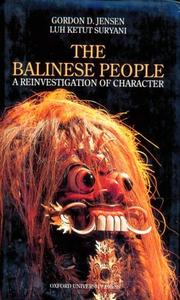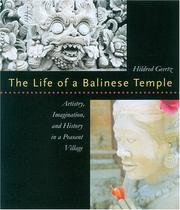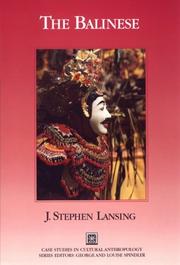| Listing 1 - 10 of 16 | << page >> |
Sort by
|
Book
ISBN: 9789053832219 9053832211 Year: 1993 Publisher: Amsterdam: VU University press,
Abstract | Keywords | Export | Availability | Bookmark
 Loading...
Loading...Choose an application
- Reference Manager
- EndNote
- RefWorks (Direct export to RefWorks)
Book
Year: 2008 Publisher: Göttingen Germany : Universitätsverlag Göttingen,
Abstract | Keywords | Export | Availability | Bookmark
 Loading...
Loading...Choose an application
- Reference Manager
- EndNote
- RefWorks (Direct export to RefWorks)
The villages on Bali's north-east coast have a long history. Archaeological findings have shown that the coastal settlements of Tejakula District enjoyed trading relations with India as long as 2000 years ago or more. Royal decrees dating from the 10th to the 12th century, inscribed on copper tablets and preserved in the local villages as part of their religious heritage, bear witness to the fact that, over a period of over 1000 years, these played a major role as harbour and trading centres in the transmaritime trade between India and (probably) the Spice Islands. At the same time the inscriptions attest to the complexity in those days of Balinese society, with a hierarchical social organisation headed by a king who resided in the interior - precisely where, nobody knows. The interior was connected to the prosperous coastal settlements through a network of trade and ritual. The questions that faced the German-Balinese research team were first: Was there anything left over of this evidently glorious past? And second: Would our professional anthropological and archaeological research work be able to throw any more light on the vibrant past of these villages? This book is an attempt to answer both these and further questions on Bali's coastal settlements, their history and culture.
Book
Year: 2008 Publisher: Göttingen Germany : Universitätsverlag Göttingen,
Abstract | Keywords | Export | Availability | Bookmark
 Loading...
Loading...Choose an application
- Reference Manager
- EndNote
- RefWorks (Direct export to RefWorks)
The villages on Bali's north-east coast have a long history. Archaeological findings have shown that the coastal settlements of Tejakula District enjoyed trading relations with India as long as 2000 years ago or more. Royal decrees dating from the 10th to the 12th century, inscribed on copper tablets and preserved in the local villages as part of their religious heritage, bear witness to the fact that, over a period of over 1000 years, these played a major role as harbour and trading centres in the transmaritime trade between India and (probably) the Spice Islands. At the same time the inscriptions attest to the complexity in those days of Balinese society, with a hierarchical social organisation headed by a king who resided in the interior - precisely where, nobody knows. The interior was connected to the prosperous coastal settlements through a network of trade and ritual. The questions that faced the German-Balinese research team were first: Was there anything left over of this evidently glorious past? And second: Would our professional anthropological and archaeological research work be able to throw any more light on the vibrant past of these villages? This book is an attempt to answer both these and further questions on Bali's coastal settlements, their history and culture.
Book
Year: 2008 Publisher: Göttingen Germany : Universitätsverlag Göttingen,
Abstract | Keywords | Export | Availability | Bookmark
 Loading...
Loading...Choose an application
- Reference Manager
- EndNote
- RefWorks (Direct export to RefWorks)
The villages on Bali's north-east coast have a long history. Archaeological findings have shown that the coastal settlements of Tejakula District enjoyed trading relations with India as long as 2000 years ago or more. Royal decrees dating from the 10th to the 12th century, inscribed on copper tablets and preserved in the local villages as part of their religious heritage, bear witness to the fact that, over a period of over 1000 years, these played a major role as harbour and trading centres in the transmaritime trade between India and (probably) the Spice Islands. At the same time the inscriptions attest to the complexity in those days of Balinese society, with a hierarchical social organisation headed by a king who resided in the interior - precisely where, nobody knows. The interior was connected to the prosperous coastal settlements through a network of trade and ritual. The questions that faced the German-Balinese research team were first: Was there anything left over of this evidently glorious past? And second: Would our professional anthropological and archaeological research work be able to throw any more light on the vibrant past of these villages? This book is an attempt to answer both these and further questions on Bali's coastal settlements, their history and culture.

ISBN: 0195885570 9780195885576 Year: 1992 Publisher: Singapore: Oxford university press,
Abstract | Keywords | Export | Availability | Bookmark
 Loading...
Loading...Choose an application
- Reference Manager
- EndNote
- RefWorks (Direct export to RefWorks)
Balinese (Indonesian people) --- Personality and culture --- Mental health. --- Psychology. --- Social life and customs. --- Balinese (Indonesian people) - Psychology. --- Balinese (Indonesian people) - Mental health. --- Balinese (Indonesian people) - Social life and customs. --- Personality and culture - Indonesia - Bali Island.

ISBN: 0824825330 9780824825331 0824864816 Year: 2004 Publisher: Honolulu: University of Hawai'i Press,
Abstract | Keywords | Export | Availability | Bookmark
 Loading...
Loading...Choose an application
- Reference Manager
- EndNote
- RefWorks (Direct export to RefWorks)
Balinese (Indonesian people) --- Temples --- Art, Balinese --- Architecture --- Batuan (Indonesia)
Book
ISBN: 2901725457 0835705986 Year: 1982 Publisher: Paris : Maison des sciences de l'homme,
Abstract | Keywords | Export | Availability | Bookmark
 Loading...
Loading...Choose an application
- Reference Manager
- EndNote
- RefWorks (Direct export to RefWorks)
Agricultural colonies --- Balinese (Indonesian people) --- Colonization --- Sulawesi Tenggara (Indonesia) --- Colonization.
Book
ISBN: 9173461083 9789173461085 Year: 1982 Volume: 4 Publisher: Göteborg: Acta Universitatis Gothoburgensis,
Abstract | Keywords | Export | Availability | Bookmark
 Loading...
Loading...Choose an application
- Reference Manager
- EndNote
- RefWorks (Direct export to RefWorks)
Balinese (Indonesian people) --- Balinais --- Economic conditions --- Social conditions --- Conditions économiques --- Conditions sociales --- Lombok (Indonesia) --- Lombok (Indonésie : Ile) --- -Balinese (Indonesian people) --- -Ethnology --- -Pulau Lombok (Indonesia) --- Lesser Sunda Islands --- Economic conditions. --- Social conditions. --- -Economic conditions --- Conditions économiques --- Lombok (Indonésie : Ile) --- Ethnology --- Pulau Lombok (Indonesia) --- Balinese (Indonesian people) - Economic conditions --- Balinese (Indonesian people) - Social conditions --- Lombok (Indonesia) - Economic conditions
Book
ISBN: 9782910513771 2910513777 Year: 2019 Publisher: Paris: Archipel,
Abstract | Keywords | Export | Availability | Bookmark
 Loading...
Loading...Choose an application
- Reference Manager
- EndNote
- RefWorks (Direct export to RefWorks)

ISBN: 0155002406 Year: 1995 Publisher: Fort Worth Harcourt Brace college publ.
Abstract | Keywords | Export | Availability | Bookmark
 Loading...
Loading...Choose an application
- Reference Manager
- EndNote
- RefWorks (Direct export to RefWorks)
Arts, Balinese --- Balinese (Indonesian people) --- Rites and ceremonies --- Bali Island (Indonesia) --- Civilization. --- Religion.
| Listing 1 - 10 of 16 | << page >> |
Sort by
|

 Search
Search Feedback
Feedback About UniCat
About UniCat  Help
Help News
News